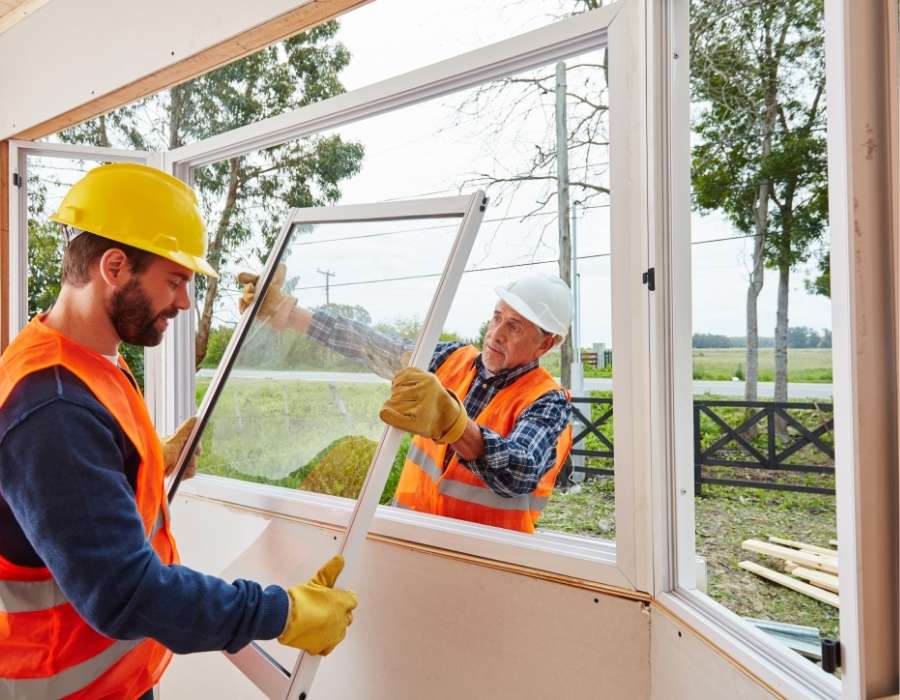How to Choose the Best Custom Home Builder for Your Dream Home
To select the finest bespoke home builder for your dream home, begin by evaluating their past projects and confirming they’re licensed and insured. Examine their credentials and pay special attention to their skill, assessing whether it matches your vision. Take heed of client reviews and emphasize the builder’s standing. Consistent communication is crucial throughout the project, so make sure you’re at ease with their approach. Conclude your builder selection by contrasting their pricing with your budget and their schedule with your timeframe. Be patient and thorough in this procedure; your diligence now can guarantee a pleasant voyage to your dream home in the future.
Initial Builder Assessment
In the world of constructing your dream home, initiating an initial builder evaluation is your first crucial step. This evaluation assists in builder selection, allowing you to assess your options wisely. The assessment helps you comprehend the advantages and disadvantages of each builder, providing you with a clearer picture of what to anticipate.
Builder comparison is another essential part of the evaluation. It’s not just about who can complete the job, but who can do it excellently. This necessitates a thorough examination of their previous projects, the standard of their work, and their capacity to meet deadlines and budgets.
Builder validation is also necessary. While we won’t delve into specifics regarding licenses and insurance in this section, it’s important to ensure your builder is legitimate and can deliver as promised. Be cautious of those who can’t provide valid references or evidence of past successful projects.
Ultimately, the aim of the evaluation is to assist in builder decision-making. After a comprehensive assessment, comparison, and validation, you’ll be well-prepared to choose a builder that aligns with your requirements and vision for your dream home. Stay diligent and trust the process.
Importance of Builder’s License and Insurance
While you might be enthusiastic to start your home-building adventure, it’s important to first confirm that your potential builder has a valid license and insurance. License verification isn’t just a checkbox on your to-do list; it’s essential for builder credibility. A valid license signifies that the builder has met the professional standards set by the government, ensuring legal compliance.
Insurance coverage is equally important for project safety. Imagine a scenario where an accident occurs on your property during construction. If your builder lacks insurance, you may be liable for any injuries sustained on your property. On the other hand, a fully insured builder shifts this risk away from you, providing peace of mind during the construction process.
Don’t shy away from asking direct questions about your builder’s license and insurance. These documents aren’t just pieces of paper; they’re assurances that your dream home is in qualified, ethical, and secure hands. Remember, building your dream home should be an exciting journey, not a legal headache. So, ensure these essential checks are in place before you start on this journey.

Reviewing Past Projects
Dive deep into the portfolios of your potential builders to gain insight into their past projects. A thorough review allows you to make a quality inspection of their work. Look for consistent craftsmanship, attention to detail, and innovative solutions for complex designs. It’s a reflection of the level of excellence you can anticipate in your dream home.
Next, conduct a design analysis. Check if their architectural styles align with your vision. Notice the flow of spaces, room layouts, and aesthetic elements. If you’re seeing projects that reflect what you have in mind, you’re on the right track.
Material selection is another aspect to scrutinize. Quality materials guarantee longevity and reduce future maintenance costs. So, sift through the details to understand their material preference and its quality.
A review of the construction timeline helps you gauge their efficiency. Do they adhere to their schedules? Delays can escalate costs and cause inconvenience.
Asking for Qualifications
Once you’ve examined past projects, it becomes important to explore the qualifications of your potential home builders. This process guides you in understanding the builder’s experience, coverage area, project type expertise, and how they can meet your specific needs.
Begin by asking about the builder’s experience. How many years have they been in the business? This often reflects their level of craftsmanship and ability to handle unexpected challenges. Next, inquire about their coverage area. Do they operate in your locality? This ensures they’re acquainted with local building codes and environmental considerations.
Don’t forget to probe into their project type expertise. Have they handled projects similar to yours? The home builder’s familiarity with your type of project can greatly impact the quality of the final product.
Your specific needs should also be a priority. Can the builder adapt to your unique requirements and preferences? Will they be able to translate your dream into a livable reality? Remember, a suitable builder is not just experienced and knowledgeable, but also flexible and attentive to your desires.
In short, asking for qualifications is a critical step in finding the best custom home builder for your dream home.
Importance of Builder’s Expertise
Amid the qualifications of your potential builder, their expertise stands out as an essential factor. You’re investing in your dream home, so it’s vital to secure a builder who can bring that dream to life. Expertise evaluation is your first step, examining the skills and specialties the builder brings to the table.
Skill assessment involves examining the builder’s range of abilities. Are they proficient in areas specific to your needs? This could include anything from eco-friendly builds to luxury finishes or historical restorations.
Next, conduct an experience verification. How long have they been in the industry? Longevity often equates to a wealth of knowledge, which is a valuable asset in any build.
Knowledge validation is important, too. Your builder should have a thorough understanding of construction codes, materials, and the latest building technologies.
Lastly, consider their specialty. If you’re dreaming of a modern, minimalist home, a builder who specializes in traditional country homes might not be the best fit.

Requesting References
When you’re zeroing in on a potential home builder, don’t forget the power of a good reference. A reference check can reveal valuable insights about the builder’s reputation and workmanship quality.
Start by asking the builder for client testimonials. These can offer a direct look into client satisfaction and the builder’s ability to meet expectations. Listen for comments on the quality of materials used, timeliness of work, and overall satisfaction with the finished product.
Next, request project examples. A builder’s past projects can tell you a lot about their style, attention to detail, and ability to manage complex tasks. Look for projects that are similar to your dream home and scrutinize the builder’s craftsmanship.
Lastly, consider the builder’s reputation in the industry. Online reviews, industry awards, and even word-of-mouth can give you a sense of the builder’s standing.
Evaluating Builder’s Reliability
Having gathered and scrutinized references, your next move should be to evaluate the builder’s dependability. Start by conducting a trustworthiness assessment. Review the builder’s reputation in the market and their track record with past projects. Look for any patterns of delays, budget overruns, or dissatisfaction among clients.
Trustworthy references can be invaluable in this process. If past clients speak positively about their experience and express satisfaction with the project outcome, that’s a good sign. Also, consider how the builder handled any hiccups along the way. A builder’s reputation isn’t just about the end product—it’s also about how they manage challenges.
Assess the builder’s communication habits. Reliable communication is essential to a successful project. If the builder is responsive, clear, and timely in their communication, that’s a positive indicator of their dependability. However, remember to keep your focus on the builder’s dependability at this stage, as the next step will explore further into the aspect of maintaining communication with your builder.
Maintaining Communication With Builder
Effective communication with your chosen builder is crucial for a successful home building project. Here’s a guide on maintaining communication with your builder.
- Regular updates: Regular updates from your builder can provide you with the peace of mind you need. Insist on receiving these updates, whether weekly or monthly, to stay informed about the progress of your dream home.
- Progress tracking: Actively track the progress of your project. This will not only keep you engaged but also allow you to spot any deviations from the plan early on.
- Project questions: Don’t hesitate to ask your builder any project questions. It’s your dream home, after all. Your builder should be able to answer your queries and clarify any doubts you may have.
- Resolving issues: If you come across any issues or concerns, communicate them to your builder promptly. They can’t fix a problem if they’re not aware of it.
Remember to establish clear communication channels from the get-go. Whether it’s through emails, phone calls, or in-person meetings, make sure you and your builder are on the same page at all times. After all, building your dream home should be a collaborative effort.
Finalizing the Builder Choice
Making the final decision of a builder is your last obstacle in setting the stage for your dream home. This choice shouldn’t be hurried; it’s about confirming availability, aligning with your budget, agreeing on a start date, and clarifying the project scope.
Start by confirming the builder’s availability. You can’t proceed if the builder is booked solid for the next few months. Next, make sure your budget aligns with the builder’s estimates. If the builder’s quote is significantly higher than your budget, it’s time to reconsider.
Agreeing on a start date is essential. It’s not just about when they can begin, but also their estimated completion time. Ensure it fits your timeline.
Clarify the project scope. Both you and the builder should have a clear understanding of what the project entails. Ambiguity can lead to misunderstandings and costly changes down the line.
Lastly, establish clear communication channels. Regular updates and easy accessibility to your builder are important for a smooth process. Whether it’s through emails, phone calls, or meetings, ensure they’re responsive.

Signing the Contract With Builder
Now that you’ve finalized your builder, it’s time to put everything in writing. This critical step transforms your dream home from a vision into a tangible plan. You’ll need to confirm that key components are clearly articulated in the contract.
- Contract Details: The contract you sign should be thorough and include all agreed-upon details. It’s not just a formality; it’s your legal safeguard. Take your time to understand the terms and conditions before signing.
- Project Scope: Your contract should clearly outline the extent of the project. It should detail the specific work to be done, the materials to be used, and the final expected outcome.
- Cost Breakdown: A detailed cost breakdown allows you to comprehend where your money is going. It should cover labor costs, material costs, and any additional charges.
- Timeline Agreement: Agree on a realistic timeline for your project. This schedule should be included in the contract, with provisions for any potential delays.
Lastly, establish clear communication channels with your builder. Regular updates and open dialogue will help ensure a smoother build process. Remember, this contract is the foundation of your dream home’s construction. Treat it with the significance it deserves.
Conclusion
Choosing a custom home builder is like piecing together a puzzle. You’ve sifted through licenses, studied portfolios, confirmed qualifications, and gauged reliability. Now, with clear communication, you’re ready to finalize your choice. Remember, this isn’t just about building a house – it’s about creating your dream home. With the right builder, the process will be as rewarding as the final product. So, pick wisely, sign that contract, and start your exciting journey towards your dream home.

